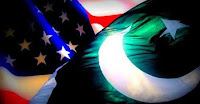The recent news about suspension of support to Pakistan’s
armed forces don’t bode well for the two countries. Pressure from the general
public is rising on the Government of Pakistan to pull itself out of proxy war
in Afghanistan.
Over the years Afghanistan has been living on aid and any
cut in inflow could lead to hike in opium cultivation in the country. Poppy
cultivation in Afghanistan has been increasing for a third year in a row and is
heading for a record high, the United Nations said in a report released on
Monday.
Afghanistan is the world's largest producer of opium, the
raw ingredient in heroin, and last year provided about 75 percent of the global
crop — a figure that may jump to 90 per cent this year due to increased
cultivation.
The southern region is expected to remain the largest opium
cultivating region in Afghanistan in 2013. Poppy cultivation in Helmand and
Kandahar, the main opium cultivating provinces in the country, is expected to
increase and Helmand is expected to retain its status as the largest opium
cultivating province in the country.
This poses two major threats because illicit shipment may
pass though Pakistan and amounts received in return may also be used for
financing terrorist activities in the country. The incidents of sabotage and
killing have witnessed sharp increase with the commencement of election
campaign. Three major incident have already reported aiming ANP, PML-N and MQM
candidates.
Historically Pak-US relationships have witnessed ‘love and
hate’ spells. Pakistani experts are of the consensus that the relations have
remained subservient to US foreign policy. Closer examination of the two most
recent eras, Ziaul Haq regime spread over one decade and Pervez Musharraf rule
also spread over a decade are the proof of this statement.
During these two eras Pakistan remained a need of the United
States because of Afghanistan. As the time for withdrawal of US troops approach
there will be a change in sentiments, the quest for democracy will begin and no
reference will be made why the dictators were supported.
In Pakistan the general elections have been scheduled for 11th
May. While the US should be following wait and see policy, there seems an
urgent need to install a government which is willing to look after the US
interest in the region. This demands revisiting Pakistan-US relationship and
deciding the priorities.
This has become a
must because critics seem to be divided into two distinct but opposite groups,
one saying United States need Pakistan’s support in ensuring peace in Afghanistan
and second believing Pakistan needs US support to overcome internal and
external threats facing the country. However, both the groups strongly believe
that musty relationship between the US and Afghan governments could prove
detrimental for both the countries.
Soldiers and military hardware from Afghanistan has to pass
through Pakistan, which needs safe passage and speedy and cost effective movement;
no one can deny that Pakistan offers the most cost effective route.
It is strongly believed that if United States avoids
offending the groups that consider it ‘occupier’ the assaults on withdrawing
forces can be minimized. Under the prevailing scenario there is high
probability that some of the Afghan warlords may intensify their attacks on
Nato troops and Afghan forces.
While both the US and Pakistani governments are trying to
improve relationship by removing the irritants, commencement of work on
Pakistani portion of Iran-Pakistan (IP) gas pipeline has been taken by the US
administration an act that makes Pakistan liable for imposition of economic
sanctions.
Most of the experts are of the view that since Pakistan
needs to overcome its energy crisis and IP offers a reliable and cost effective
solution, US administration should not oppose this, mainly because looming
energy crisis is adversely affecting Pakistan’s economy and GDP growth. An
economically strong Pakistan can help in maintaining peace and boosting
economic activities in Afghanistan after the withdrawal of Nato forces.
Any adverse decision can heighten anti US sentiments in
Pakistan and imposition of economic sanctions could lead to poor law and order
situation that may delay holding general elections in the country. The unrest
in Pakistan can also cause disruption in the movement of Nato troops and
hardware through Pakistan.
Over the years Pakistan has been able to weed out militants
and contain their movement across the border and any lapse could prove fatal
for the three stakeholders, Nato, Afghanistan and Pakistan.

No comments:
Post a Comment